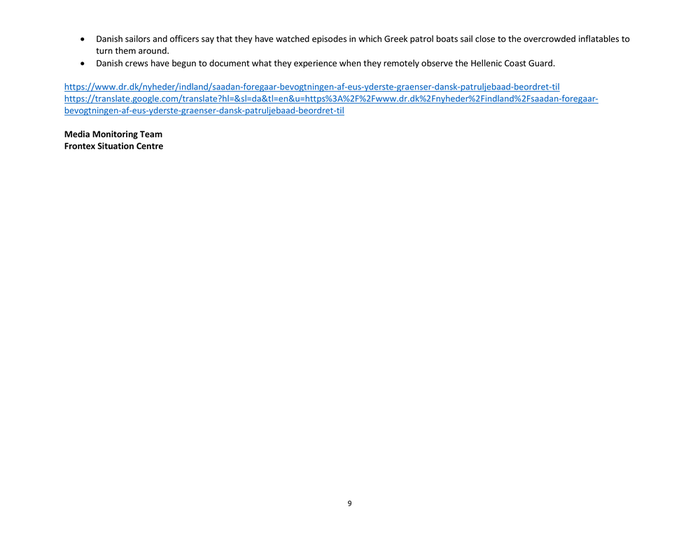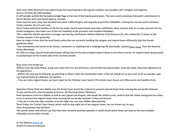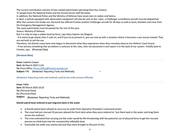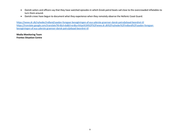Frontex - internal e-mails
Dieses Dokument ist Teil der Anfrage „Danish patrol boat incident“
Subject: [Redacted: Reporting tools and methods used by law enforcement officials] From: [Personal Data] Sent: Friday, March 6, 2020 8:13 PM To: [Personal Data] Cc: [Personal Data] Subject: Re: [Redacted: Reporting Tools and Methods] Dear [Personal Data] Thank you very much for the precise and detailed feedback. I understand that the incident has been properly handled by our coordinating officer and the point has been made by Frontex about this incident but also the compliance in future with Frontex OPLAN. This from my perspective the incident is closed. Thank you very much. [Personal Data] Sent from my iPhone On 6 Mar 2020, at 16:59, [Personal Data] wrote: Dear, Please see below the information collected by the Operational Team of Poseidon JO. As it seems this was an isolated case that was not discussed during the daily meeting at the Coordination Centre. [Redacted] Reading the description below, there was a first instruction for transferring the migrants back to the rubber boat, by the Greek LO on board the DK vessel, that was amended by ICC when consulted due to the risks of such operation. Frontex CO stressed the instruction to ICC that our 1

deployed vessels operate according to the Operational Plans and no contrary instructions are to be given. Coordinating Officer will pay particular attention to the situation [Redacted] Best regards, [Personal Data] From: [Personal Data] The non-disclosed part contains detailed information on the me Sent: 06 March 2020 15:43 the course of future and ongoing operations aimed at curtailing information would undermine the protection of the public inter To: [Personal Data] Cc: [Personal Data] The non-disclosed part contains personal data, in particular, the Union legislation regarding the protection of personal data and Subject: [Redacted: Reporting tools and methods] The non-disclosed parts contain detailed information reg Dear [Personal Data] expose the working methods used in ongoing and future to national return decisions. This would endanger the pu Please find below information related the incident: safety of aircraft, passengers and crew. In this light, the d first indent of Regulation (EC) No 1049/20011 and theref On 02.03.2020 around 05:25 hrs a migrants’ rubber boat was observed and intercepted by the Danish CPB at sea area of KOS 33 migrants were rescued and transferred to the [Redacted] according to the previous SOP HCG Liaison Officer –Technical Equipment (LO-TE) informed a crew about an order from his authority to transfer the migrants back to the rubber boat and escort / transport them into TUR territorial waters (TTW) The vessel commander considered this action very risky and informed the DNK National Official (NO) at the ICC The DNK NO [Redacted] forwarded information to ICC/HCG, who then cancelled the order to transfer the migrants back into the rubber boat A new order was given to bring the migrants to Kos Harbour and hand them over to HCG The issue was closed, there were no further discussions [Redacted] [Redacted] [Redacted] [Redacted] In addition, Frontex Coordinating Officer deployed to the [Redacted] urged all JCB meeting participants’ to follow the provisions of the Operational Plan (JO Poseidon 2020) and NOs were tasked to report any type of incidents during the JCB meetings in the future. FDU Assessment: 2

DNK asset acted according to the OPLAN provisions. [Redacted] {Redacted] Regards [Personal Data From: [Personal Data] Sent: Friday 6 March 2020 12:06 To: [Personal Data] Cc: [Personal Data] Subject: [Redacted: Reporting Tools and Methods] Importance: High Dear [Personal Data] Do we have any information on this situation, or similar ones? I expect that ED and MPR will request some feedback from ORD/PRU. Best regards, [Personal Data] [Personal Data] From: Izabella Cooper Sent: 06 March 2020 11:39 To: [Personal Data] Cc: [Personal Data] Subject: [Redacted: Reporting Tools and Methods] Dear Fabrice, dear colleagues, The article below was just published by the Danish news agency and is already making rounds in international media. We will soon need a line on what to say about this as many journalists are already calling and COM press office is also asking about it as they will soon enter the press conference at 12:00. In essence the article says: The Greek authorities have ordered our Danish patrol boat ordered to put migrants back in the water after the rescue 3

The Danish patrol boat deployed by Frontex refused to carry out an order from Operation Poseidon’s command center. The crew had just rescued 33 persons aboard the front deck when they were ordered to “put them back in the water and drag them across the seafront'. The crew estimated that carrying out the order would be life-threatening with the potential use of physical force to get the rescued persons to climb back into the unseaworthy inflatable boat. Eventually the order was overturned and they were brought to the port of Kos. Danish sailors and officers say that they have watched episodes in which Greek patrol boats sail close to the overcrowded inflatables to turn them around. Danish crews have begun to document what they experience when they remotely observe the Hellenic Coast Guard. [Redacted] Please see goggle translation below: Here's how to guard the EU's outer borders: Danish patrol boat ordered to put refugees back in the water Danish Frontex crew refused to obey controversial order in deadly waters. Defense Minister Trine Bramsen (S) visited the Danish Frontex patrol boats on Kos in Greece on Wednesday. Here, Danish crews said they had recently refused to obey an order to put refugees back in the water. (© [Personal Data] / DR News) By [Personal Data] Since the refugee and migrant crisis in 2015, efforts have primarily been about immigration. Denmark is part of the Frontex operation 'Poseidon', which supports Greece with border surveillance. Since June 2019, Denmark's two patrol boats have participated in 86 migrant incidents and handled 1,817 refugees and migrants. A stiff boulder unfolds the formation bridge flags at the rear of the Danish patrol boats. The two vessels constitute Denmark's contribution to the EU Border and Coast Guard Agency, Frontex. Since June last year, they have handled more than 1,800 refugees and migrants in primitive inflatables, crossing the narrow waters between Turkey and Kos. But it's over now. Since Turkey opened its borders to the EU last week, Danish patrol boats have been withdrawn. Now, instead, they act as eyes and ears for the Greek coastguard, who takes care of the very handling of the primitive and crowded inflatables. This is what the Danish operations manager says during a briefing for Defense Minister Trine Bramsen (S), who visited the 17 Danes at the Frontex mission in Kos yesterday. Here he makes it clear that the local Greek authorities are currently handling the refugee and migrant boats differently than the Danish guidelines allow. - Our contribution is not going to make any actions, maneuvers or other things that jeopardize life and health, explains Jens 4

Møller from the National Police afterwards. He refers to video clips of Greek patrol boats sailing close to the overcrowded migrant boats to turn them around. Or migrant boats being towed or pushed back on the Turkish side of the maritime border. Busy since crisis broke out Officers from the State Police, along with crews from the Armed Forces, manned the two patrol boats. Since last week, they have tightened up the operations. Operation Police Chief Jens Møller says that the Greek Coast Guard has ordered to prevent migrant boats from crossing the sea border between Turkey and the EU's external border at Greece. (© [Personal Data] / DR News) Both operations chief Jens Møller as well as war captain Jan Niegsch, who heads the military crew, confirm that the Greek coastguard has orders to try to prevent the migrant boats from crossing the sea border between Turkey and Greece. - They do it in the way they consider to be the right one, says [Pers Data] diplomatically. Since Friday, the Turkish coast guard, which used to stop eight out of ten migrant boats, has not shown up, he says. Have documented risky behavior The Danish sailors and officers say that they have remotely watched episodes in which Greek patrol boats sail close to the overcrowded inflatables to turn them around. But it is risky to stop a rubber boat by force, says Navy Captain [Personal Data] - If it wants to go ahead, then it sails on, and if you try to prevent it, you can end up with a situation where it becomes a sea rescue instead. They are not built to sail the sea. Therefore, the Danish crews have now begun to document what they experience when they remotely observe the Hellenic Coast Guard. - If we witness something that we believe is contrary to the rules, then we document it and report it to the back of our system. Initially back to Frontex, says [Personal Data] But it is risky to stop a rubber boat by force, says Navy Captain [Personal Data] - If it wants to go ahead, then it sails on, and if you try to prevent it, you can end up with a situation where it becomes a sea rescue instead. They are not built to sail the sea. Danes got controversial order Several of the crew say that it is about the rules of good seamanship and the obligation to help people in the sea. Afterwards, they have usually sailed the passengers, who may be older people, women and children all the way down to the age 5

of two, to the port of Kos. However, most are younger men, they say. ILLUSTRATION BOX: Danish Frontex contribution The current contribution consists of two coastal patrol boats operating from Kos, Greece. 17 people from the National Police and the Armed Forces staff the boats. In addition, the National Police and the Ministry of Defense have seven men in Lesbos and Samos. In April, a vehicle equipped with observation equipment will also be sent to Kos. Later, a Challenger surveillance aircraft must be dispatched. After the current crisis broke out, Denmark has offered Frontex another Challenger aircraft for 30 days as well as tents, blankets and crew from the Emergency Management Agency. The coast patrol boats must be posted for the rest of the year. Source: Ministry of Defense [Personal Data] From: [Personal Data] Sent: 06 March 2020 11:06 To: Izabella Cooper <izabella.cooper@frontex.europa.eu>; Press.Office <Press.Office@frontex.europa.eu> Subject: RE: [Redacted: Reporting Tools and Methods] Here's how to guard the EU's outer borders: Danish patrol boat ordered to put refugees back in the water Danish Frontex crew refused to obey controversial order in deadly waters. Defense Minister Trine Bramsen (S) visited the Danish Frontex patrol boats on Kos in Greece on Wednesday. Here, Danish crews said they had recently refused to obey an order to put refugees back in the water. (© [Personal Data] / DR News) By [Personal Data] March 5, 2020 at 21.6 Larger Text Read up Gray-painted hulls carve into the moorings. Wave slumps strike over the concrete mill, shielding the port on the Greek island of Kos from the open water. Frontex in numbers EU Border and Coast Guard Agency Frontex monitors Europe's borders. Since the refugee and migrant crisis in 2015, efforts have primarily been about immigration. Denmark is part of the Frontex operation 'Poseidon', which supports Greece with border surveillance. 6

Since June 2019, Denmark's two patrol boats have participated in 86 migrant incidents and handled 1,817 refugees and migrants. Source: Frontex, DK CPB Poseidon. A stiff boulder unfolds the formation bridge flags at the rear of the Danish patrol boats. The two vessels constitute Denmark's contribution to the EU Border and Coast Guard Agency, Frontex. Since June last year, they have handled more than 1,800 refugees and migrants in primitive inflatables, crossing the narrow waters between Turkey and Kos. But it's over now. Since Turkey opened its borders to the EU last week, Danish patrol boats have been withdrawn. Now, instead, they act as eyes and ears for the Greek coastguard, who takes care of the very handling of the primitive and crowded inflatables. This is what the Danish operations manager says during a briefing for Defense Minister Trine Bramsen (S), who visited the 17 Danes at the Frontex mission in Kos yesterday. Here he makes it clear that the local Greek authorities are currently handling the refugee and migrant boats differently than the Danish guidelines allow. - Our contribution will not be to do actions, maneuvers or anything that is endangering life and health, explains [Pers Data] from the National Police afterwards. He refers to video clips of Greek patrol boats sailing close to the overcrowded migrant boats to turn them around. Or migrant boats being towed or pushed back on the Turkish side of the maritime border. Busy since crisis broke out Officers from the State Police, along with crews from the Armed Forces, manned the two patrol boats. Since last week, they have tightened up the operations. - Before, the task was to help pick up and bring in ashore. Now the relationship order is that we should act as eyes and, as far as possible, spot any migrant boats at a distance, he explains. - If we see some migrant boats, we must report to the 'Hellenic Coast Guard' (The Greek Coast Guard, ed.) Who comes and handles them. Operation Police Chief Jens Møller says the Greek Coast Guard has ordered to prevent migrant boats from crossing the sea border between Turkey and the EU's external border at Greece. (© [Personal Data] / DR News) Both operations chief Jens Møller as well as war captain Jan Niegsch, who heads the military crew, confirm that the Greek coastguard has orders to try to prevent the migrant boats from crossing the sea border between Turkey and Greece. - They do it in the way they consider to be the right one, says Jens Møller diplomatically. Since Friday, the Turkish Coast Guard, which used to stop eight out of ten migrant boats, has not shown up, he says. Have documented risky behavior The Danish sailors and officers say that they have remotely watched episodes in which Greek patrol boats sail close to the overcrowded inflatables to turn them around. © The Defense Gallery.dk Danish Frontex contribution 7

The current contribution consists of two coastal patrol boats operating from Kos, Greece. 17 people from the National Police and the Armed Forces staff the boats. In addition, the National Police and the Ministry of Defense have seven men in Lesbos and Samos. In April, a vehicle equipped with observation equipment will also be sent to Kos. Later, a Challenger surveillance aircraft must be dispatched. After the current crisis broke out, Denmark has offered Frontex another Challenger aircraft for 30 days as well as tents, blankets and crew from the Emergency Management Agency. The coast patrol boats must be posted for the rest of the year. Source: Ministry of Defense But it is risky to stop a rubber boat by force, says Navy Captain Jan Niegsch. - If it wants to go ahead, then it sails on, and if you try to prevent it, you can end up with a situation where it becomes a sea rescue instead. They are not built to sail the sea. Therefore, the Danish crews have now begun to document what they experience when they remotely observe the Hellenic Coast Guard. - If we witness something that we believe is contrary to the rules, then we document it and report it to the back of our system. Initially back to Frontex, says [Personal Data] [Personal Data] From: Izabella Cooper Sent: 06 March 2020 11:01 To: Press.Office <Press.Office@frontex.europa.eu> Subject: FW: [Redacted: Reporting Tools and Methods] r [Redacted: Reporting tools and methods used by law enforcement officials] From: FMM Sent: 06 March 2020 10:23 To: [Personal Data] Cc: [Personal Data] Subject: [Redacted: Reporting Tools and Methods] Danish patrol boat ordered to put migrants back in the water A Danish patrol boat refused to carry out an order from Operation Poseidon’s command center. The crew had just rescued 33 persons aboard the front deck when they were ordered to “put them back in the water and drag them across the seafront'. The crew estimated that carrying out the order would be life-threatening with the potential use of physical force to get the rescued persons to climb back into the unseaworthy inflatable boat. Eventually the order was overturned and they were brought to the port of Kos. 8
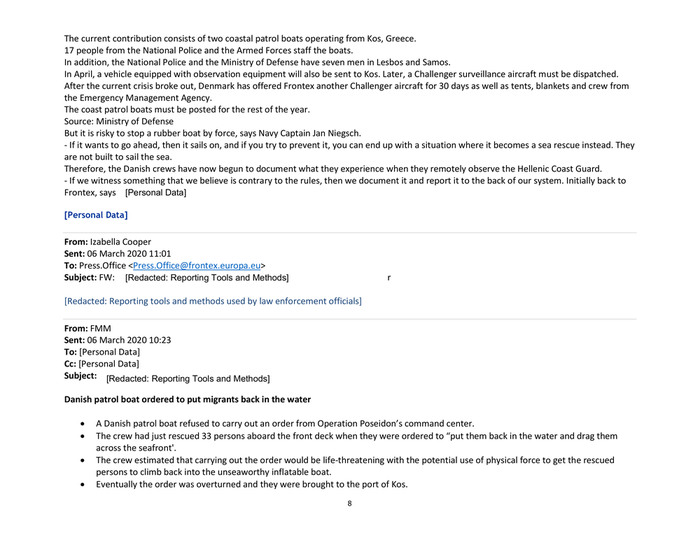
Danish sailors and officers say that they have watched episodes in which Greek patrol boats sail close to the overcrowded inflatables to turn them around. Danish crews have begun to document what they experience when they remotely observe the Hellenic Coast Guard. https://www.dr.dk/nyheder/indland/saadan-foregaar-bevogtningen-af-eus-yderste-graenser-dansk-patruljebaad-beordret-til https://translate.google.com/translate?hl=&sl=da&tl=en&u=https%3A%2F%2Fwww.dr.dk%2Fnyheder%2Findland%2Fsaadan-foregaar- bevogtningen-af-eus-yderste-graenser-dansk-patruljebaad-beordret-til Media Monitoring Team Frontex Situation Centre 9
